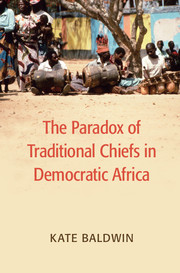Book contents
- Frontmatter
- Dedication
- Contents
- List of Figures
- List of Tables
- Acknowledgments
- PART I TOWARD A NEW THEORY OF CHIEFS
- 1 The Paradox of Chiefs
- 2 Conceptualizing Chiefs
- 3 Traditional Leaders and Democracy
- 4 Chiefs as Development Brokers
- PART II CHIEFS, DEVELOPMENT, AND ELECTIONS IN ZAMBIA
- PART III TRADITIONAL LEADERS IN AFRICA AND BEYOND
- Appendix A Cross-National Data Set of Chiefs' Power
- Appendix B List of Interviews and Interview Protocols
- Appendix C Data Set on Local Public Goods and Chiefs
- Appendix D Survey of Chiefs and Chiefdom-Level Data Set
- Appendix E Household Survey and Experiment
- References
- Index
- Books in the Series
1 - The Paradox of Chiefs
from PART I - TOWARD A NEW THEORY OF CHIEFS
Published online by Cambridge University Press: 05 November 2015
- Frontmatter
- Dedication
- Contents
- List of Figures
- List of Tables
- Acknowledgments
- PART I TOWARD A NEW THEORY OF CHIEFS
- 1 The Paradox of Chiefs
- 2 Conceptualizing Chiefs
- 3 Traditional Leaders and Democracy
- 4 Chiefs as Development Brokers
- PART II CHIEFS, DEVELOPMENT, AND ELECTIONS IN ZAMBIA
- PART III TRADITIONAL LEADERS IN AFRICA AND BEYOND
- Appendix A Cross-National Data Set of Chiefs' Power
- Appendix B List of Interviews and Interview Protocols
- Appendix C Data Set on Local Public Goods and Chiefs
- Appendix D Survey of Chiefs and Chiefdom-Level Data Set
- Appendix E Household Survey and Experiment
- References
- Index
- Books in the Series
Summary
On the eve of African independence, traditional chieftaincy appeared on the verge of being brushed away by a new democratic politics. Most of the new nationalist leaders shared the view that chiefs were antidemocratic local despots. In the words of the Ghanaian Minister of Local Government, “Democracy … implies the transfer of power from the official and the chief to the common man.” In Mozambique, the first president of the Frente de Liberação de Moçambique (FRELIMO) agreed, stating that traditional government “cannot form a satisfactory foundation for the needs of a modern state… The survival of such systems is obviously a hindrance to the progress of a revolution that aims at social and political equality.” A young Nelson Mandela drew a similar contrast between chieftaincy and democracy when he told his nephew, a traditional chief, “the people want democracy and political leadership based on merit not birth.”
The institution of chieftaincy clashed with the nationalist movements' calls for political equality and democracy. In addition, the administrative functions these hereditary leaders had performed for the colonial state had delegitimized them in the eyes of the independence movement leaders. Across Africa, nationalist leaders called for the removal of chiefs and the transfer of their power to efficient new bureaucracies overseen by elected politicians. The removal of traditional chiefs was seen as a prerequisite for the modern democratic states that the new generation of leaders intended to build.
The campaigns against chiefs after independence were not just rhetorical. Laws were passed abolishing the positions of chiefs shortly after independence in Guinea, Mozambique, and Tanzania. Kings were deposed in Burundi and Uganda. The governments of Burkina Faso and Benin temporarily banned the replacement of chiefs following their death for periods in the 1960s and 1970s, respectively. Even when chiefs were not whole-scale eliminated, as in Ghana and Zambia, the independence-era governments reduced their judicial and administrative roles, transferring powers they had previously held to official courts or local councils.
Yet, more than fifty years later, most efforts to replace chiefs have failed. Across Africa, traditional leaders run court systems, allocate land, and organize local labor gangs. Furthermore, the leaders of the same political movements who objected so passionately to the positions of traditional chiefs in the 1950s and 1960s have actively increased the power of chiefs during their countries' transitions to democracy.
- Type
- Chapter
- Information
- Publisher: Cambridge University PressPrint publication year: 2015
- 1
- Cited by



